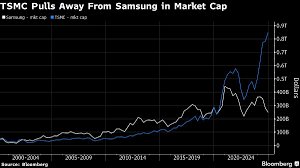Just a few months ago, Samsung Electronics Co. looked primed to benefit from the global AI boom: profits were surging and its stock was rising toward an all-time high.
Now, South Korea’s biggest company has become a stark example of how quickly fortunes can turn in an industry where the spoils go to those who maintain a technological edge.
As concerns mount that the company is losing out to smaller rival SK Hynix Inc. in AI memory and failing to gain on Taiwan Semiconductor Manufacturing Co. in outsourced chipmaking, Samsung shares have tumbled 32% from this year’s peak on July 9. The company has lost $122 billion of market value in that span, more than any other chipmaker worldwide.
Samsung has promised an overhaul to regain competitiveness, but international money managers including Pictet Asset Management Ltd. and Janus Henderson Investors SP Ltd. are unconvinced a turnaround is imminent. Overseas investors have sold about $10.7 billion worth of the South Korean company’s shares on a net basis since the end of July.
“We have more than halved our position in Samsung over the last few months — it was the largest position in our strategy in July,” said Sat Duhra, a portfolio manager at Janus Henderson Investors SP in Singapore. While Duhra said the shares have fallen to an attractive valuation, he has “no intention” to buy them for now.
Fading Fast
Smartphones and other consumer electronics still account for the biggest share of Samsung’s sales, but semiconductors have been contributing the most profit in recent years. With the recent crisis in its chip business, the Suwon-based company issued a rare apology to investors earlier this month for disappointing results.
The company’s story highlights how AI is the key factor minting winners and losers in today’s chip sector. While foreign investors have led an exodus from Samsung, Nvidia Corp. has become one of the world’s largest companies. TSMC, the key maker of chips designed by Nvidia and Apple Inc., has added over $330 billion in market value this year.
Things went south for Samsung quickly. Its stock flirted with a record high after it posted a 15-fold surge in operating profit for the June quarter. As recently as August, investors were optimistic it could win more business supplying Nvidia with high-bandwidth memory to work alongside AI processors.
That hope has been snuffed out with the company admitting delays with its latest-generation HBM chips in early October, soon after SK Hynix said it had begun volume production. Meanwhile, US rival Micron Technology Inc. is stepping up efforts in HBM as well, and has reported strong demand for its offerings.
Samsung is “losing its technology leadership in the semiconductor business,” said Young Jae Lee, London-based senior investment manager of the global emerging markets high-dividend team at Pictet Asset Management. “Technology leadership is difficult to regain in the short term by nature,” he said, adding that the firm has been reducing its Samsung holding.
Management Woes
Beyond its lag in AI memory, Samsung has struggled with a costly, yearslong effort to close the gap with TSMC in foundry business. Like Intel Corp. — which has run into similar difficulty with plans to expand its outsourced chipmaking operations — the Korean firm is now moving to cut jobs and make other efforts to stop the bleeding.
Samsung is holding a conference call on Thursday after it releases detailed third-quarter earnings. Among points to watch is an expected management reshuffle before the end of the year, amid ongoing uncertainty over company leadership.
Jay Y. Lee — a grandson of Samsung’s founder who was appointed executive chairman two years ago — was acquitted of stock manipulation charges in February after years of legal issues. Three months later, the company unexpectedly replaced its semiconductor division head with Jun Young-hyun, a memory chip veteran.
Management may have its work cut out for it in trying to win back investors, even with stock valuations near a record low and technical indicators flashing oversold signals.
“We don’t see much is changing with the Samsung executives and engineers are leaving the company,” said Park Jinho, head of equity investment at NH-Amundi Asset Management Co. in Seoul. Park reduced Samsung to underweight from neutral at the end of the second quarter and added SK Hynix instead.
Source:norvanreports.com

